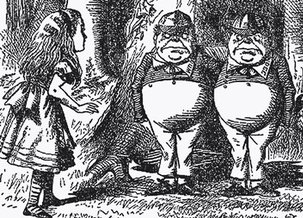"He's dreaming now," said Tweedledee: "and what do you think he's dreaming about?" |
The first installment of the story begins and ends with dreams. In the opening verses, Joseph is the favorite son of his father, which earns him the envy and the malice of his ten older brothers. Joseph tells his brothers his dream in which a sheaf of gathered wheat, representing himself, stands up straight while the other sheaves, representing his brothers, bow down to his sheaf. In another dream, the stars, sun and moon bow down to Joseph in an omen that he would rule over his brothers and parents one day.
Needless to say, Joseph's brothers did not like the dreams, or the dreamer, one little bit.
At the end of this week's parashah, the predictions of grandeur suggested by Joseph's dreams do not seem to be panning out. His life has been a series of ups and downs. He has gone from being the favorite son to being cast down into slavery. From there, he has risen to a position of authority and power, only to fall again into a dungeon cell. It is in this pit that we encounter the second set of dreams. The king's baker and wine steward have been sent down to the dungeon with Joseph and each of them has a dream which Joseph interprets correctly. The wine steward's dream augurs the restoration of his fortunes, while the baker's dream presages his execution.
What do all of these dreams mean? Like the story of Joseph itself (and, for that matter, like the entire Torah), the dreams seem to cry out for interpretation. Joseph is an interpreter of dreams and, so, he is like us when we read his story. It is entirely possible that the Torah, which was written to be interpreted, is having a meta-conversation about itself and the nature of interpretation.
Is interpretation something that is imposed upon a dream/text, or are they one? Who is the dreamer/writer? Who is the interpreter? In the story, it appears that Joseph and we, the readers, are both dreamers and interpreters of the text that we call our lives, searching for meaning and for some comprehension that will answer the ultimate question: How shall we live?
Already, in this parashah, there are hints of the direction that the Joseph saga will take in answering these questions. We can apply all our intellect and discernment to the interpretation of our lives, but we cannot predict or control them. The twists and turns of life can take us from favorite son to slave, and from top honcho to bottom-dwelling prisoner—all despite our best efforts to understand what is happening to us.
If we are wise, though, we will recognize that the dream we are dreaming in this life and its interpretation are not texts that we have written ourselves. As Joseph tells his fellow prisoners, "Is it not so that interpretation belongs to God?" (Genesis 40:8).
We dream our lives, we interpret them, we live and we seek understanding, but we are not the authors. How do you resolve the paradox of the dreamer who interprets his dream while he is still dreaming it? It can only be understood by knowing that there is one Dreamer who dreams us all.
Other posts on this theme:
Pinchas: Five Sisters Who Turned the Key to Unlock the Torah


 RSS Feed
RSS Feed
